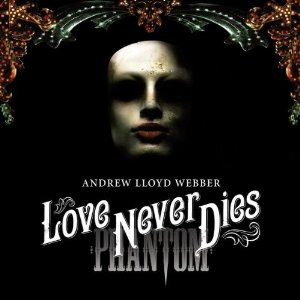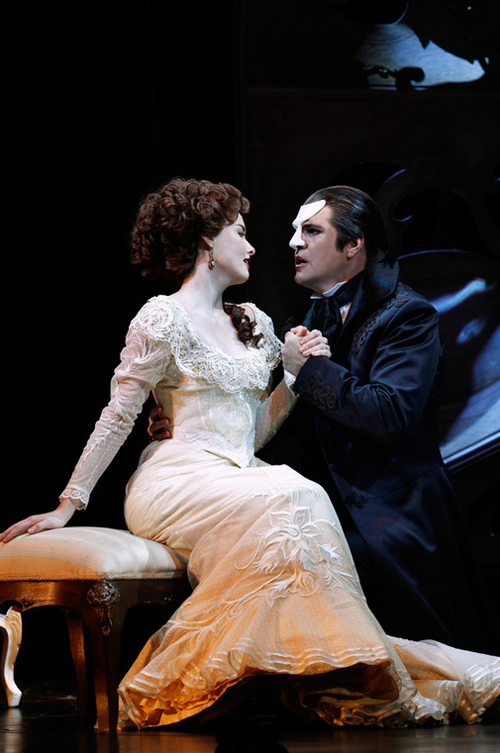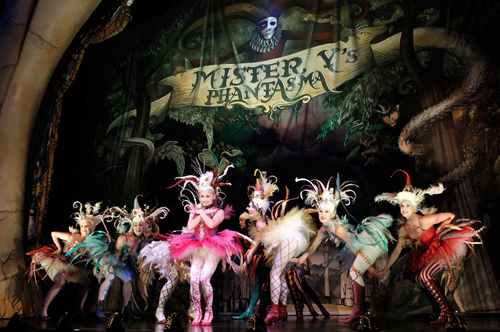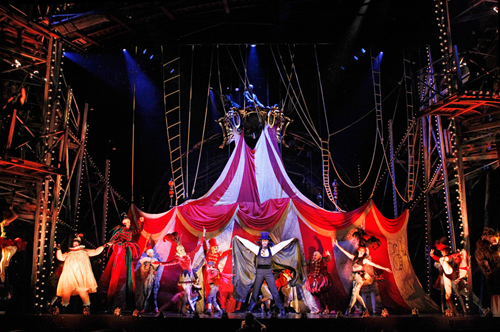There are generally two types of Phantom fans:
The crazy, obsessive variety who hold everything to impossible standards and will pick apart every performance and adaptation of Phantom like vultures (these are the same people who write tawdry phan-fiction and believe Joel Schumacher’s 2004 film version is a pile of rubbish), and those like me who simply enjoy Phantom, in all of its various forms, for what it is—a damned good story no matter how it’s told. Like Robin Hood or The Count of Monte Cristo, it’s one of those classic stories that will be retold and rediscovered through the ages, with or without Andrew Lloyd Webber’s help.

As the sequel to one of the most beloved and obsessed-over musicals of all time, Love Never Dies was bound to ruffle a few feathers, but the reality is that it has been plagued with problems almost since its inception. Die-hard Phantom fans, or “phans” if you will, have been on something of an anti-LND crusade. Feeling betrayed by Andrew Lloyd Webber’s decision to extend the canon of his masterpiece by essentially “making shit up,” they argue that the sequel takes too much liberty with the story and characters of Gaston Leroux’s original novel. Many phans simply choose not to acknowledge that a sequel even exists.
The critics have not been kind either, panning everything from the libretto to the choreography. One even cruelly dubbed the show “Paint Never Dries.” After a disappointing run in London’s West End, Love Never Dies was almost completely overhauled and the production moved to Melbourne, Australia, then later to Sydney, where it’s currently set to run until April.
Despite the the harsh criticism and phan backlash, the reworked show seems to have found its audience in Australia where its getting rave reviews and playing to sold out venues. The September 15, 2011 8:00 PM performance of the Melbourne production was filmed for release on DVD and Blu-Ray and is currently playing in theaters, so that is the version I will be reviewing.
Synopsis
Beware: lots of spoilers below. You’ve been forewarned!
Set ten years after the events in Phantom, Love Never Dies shifts us from the majestic Paris opera house setting to the carnivalesque spectacle of 1920’s Coney Island. We learn that The Phantom has established a new artistic base of operations in Phantasma, a musical menagerie of sorts, with the help of familiar characters Madame Giry and her daughter Meg, who smuggled him out of Paris. Known only to his performers and patrons as “Mr. Y,” The Phantom is the mysterious figure behind Phantasma’s—and Meg Giry’s—success.
Yearning to hear his beloved Christine Daaé sing for him once again, The Phantom sends her an anonymous invitation to make her American debut at his theater. Now married to the Vicount de Chagny, Christine accepts the invitation and arrives by boat to much fanfare with her husband Raoul and young son Gustav in tow. Evidently Raoul has become a distant husband as well as father, is in dire financial straits, and is also quite fond of the drink.
The Phantom soon reveals himself to Christine in her hotel room, who is of course shocked and bewildered, but still unable to resist him. In “Beneath a Moonless Sky” we learn that Christine and The Phantom once shared a secret night of passion, and that “Once Upon Another Time”, Christine was prepared to break her engagement with Raoul for her masked lover. But it was The Phantom who in fact rejected Christine, breaking her heart.

Their semi-romantic interlude is interrupted by Gustav, who awakens from a terrible nightmare. Christine introduces him to “Mr. Y”, saying that he’s an old friend of hers. The Phantom is enchanted by the boy, and Gustav likewise.
Gustav grows increasingly enthralled with Phantasma as The Phantom introduces him to his world in “The Beauty Underneath.” When Gustav plays a beautiful melody on the piano, his extraordinary musical talent causes The Phantom to begin to suspect that he’s really the boy’s father. Believing that Gustav will accept him, he takes off his mask which causes Gustav to run away, screaming. He retreats to his mother, who when confronted by The Phantom, admits that Gustav is his son. He makes Christine promise not to ever tell Gustav that he is his father, but promises to leave him everything he owns. Unfortunately, Madame Giry overhears all of this.

As the reigning star of Phantasma, Meg considers herself Mr Y’s protege. When she learns of Christine’s opportunity, she can barely hide her jealousy. Madame Giry is none too thrilled about The Phantom’s obsession with Christine, having a vested interest in her own daughter’s future and feeling betrayed after all she’s done for him. She exposes The Phantom and his plans to Raoul, who storms off in a fit of rage and later goes to drown his sorrows at the bar, questioning Christine’s love for him.
The Phantom drops in on Raoul and makes a bet: if Christine does not sing for him, she is free to leave with Raoul and her son. If she does sing, however, Raoul must leave alone. To make a long story short (because this synopsis is already getting ridiculously long), Christine does end up staying and singing for The Phantom, despite Raoul’s pleadings that they leave together as soon as possible.
After her stunning performance of “Love Never Dies,” Gustav mysteriously disappears. Meg Giry, in a jealous rage, has kidnapped him and taken him to the docks, threatening to drown him. The Phantom, Christine, and Madame Giry arrive just in time, and The Phantom is able to get the boy safely away from her. However, Meg pulls out a pistol and threatens to kill herself instead. In the midst of a lengthy, emotional tirade where Meg reveals all sorts of unsavory things about herself, The Phantom tries to wrestle the gun away from her and she accidentally shoots Christine in the stomach.
As Christine lay dying in The Phantom’s arms, she tells Gustav that he is the boy’s real father. Gustav runs off to find Raoul, who arrives on the scene too late. Christine and The Phantom profess their undying love and then kiss their final kiss. As the curtain closes, Gustav removes The Phantom’s mask and embraces him.
First, the not-so-good stuff:
To appreciate Love Never Dies, you have to sort of let go of any preconceived notions you might have about the characters. The Phantom a loving father figure? Raoul an abusive drunk? Meg Giry a prostitute? Accepting these new realities requires putting aside the outcomes of the events in The Phantom of the Opera. And people can certainly change a lot in ten years.
Admittedly, the plot is kind of a mess, especially toward the end. If I hadn’t known what to expect from having listened to the soundtrack so many times, I probably would not have fully grasped what was going on. One of the main criticisms of the show’s original production was its nonsensical plot. I completely understand why it had to be reworked. On the other hand, it feels strange to watch something that you know has been significantly tweaked because the edits tend to seem all the more obvious.
Being reworked also means that some musical themes from The Phantom of the Opera were injected into the score. In between the new songs, you’ll hear hints of Phantom songs like “Angel of Music” and “Prima Donna.” Supposedly the current iteration of the show includes many more of these invasive musical interludes than the original production. It’s difficult not to notice these melodies when you hear them, and I found myself wondering if they were necessary additions.
And now on to the good stuff:
My first introduction to Love Never Dies was through its soundtrack (the full original cast recording is available on Spotify), which I fell immediately in love with and ended up listening to on repeat while at work.
Musically, Love Never Dies is exceptional. It’s full of hauntingly beautiful themes (“Beneath a Moonlit Sky”, “Once Upon Another Time”, “‘Till I Hear You Sing”) and grand, sweeping waltzes (“The Coney Island Waltz”, “Look With Your Heart”) that, when they bloom, will make your heart swell with emotion. Andrew Lloyd Webber has described it as being the most beautiful score he’s ever written, and I don’t believe he’s exaggerating.
It’s also one of the most visually stunning musicals ever produced. Coney Island provides a vibrant, spectacular backdrop to the drama unfolding on the stage. The costumes, especially those of the circus performers, are lush and imaginative.

I won’t pretend to know more than I do about theater (which is very little) but I must commend the extraordinarily talented cast. The singing, dancing and acting were all top notch. The show opens with Ben Lewis’ (The Phantom) powerful performance of “‘Till I Hear You Sing”, which kicks off the first in a long series of big, ambitious musical numbers to come. I was especially impressed by Anna O’Byrne (Christine Daaé), whose vocals on songs like “Once Upon Another Time” took my breath away.
In terms of the overall message or moral of the story, I much prefer Love Never Dies’ mature view of life and love over the impossibly idealistic “happily ever after” ending of Phantom. Christine’s “safe” choice of suitors has always bothered me, and the sequel attempts to explore what might have been had Christine given in to her true desires. It’s a flimsy basis for a sequel to be sure, but it does manage to provide answers to the questions we’re left with at the end of Phantom. For the people who were rooting for The Phantom and Christine, Love Never Dies is like a beautifully-wrapped gift.
The bottom line:
Though Love Never Dies doesn’t quite manage to capture the same magic as the original (and let’s be honest, sequels rarely, if ever, do) it’s still a highly enjoyable production that is well worth watching. But even if the show doesn’t manage to captivate you, the music probably will.
Does the world really need a sequel to The Phantom of the Opera, the most successful musical of all time? Most people would probably say no. But those people would be missing out on something really special.
ShezCrafti’s Rating:
![]()
![]()
![]()
![]()
![]()
![]()
![]()
![]()
![]()
![]()
8 out of 10 stars.


